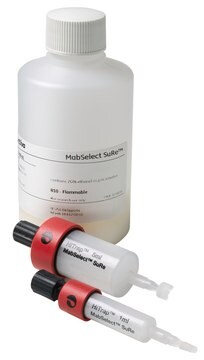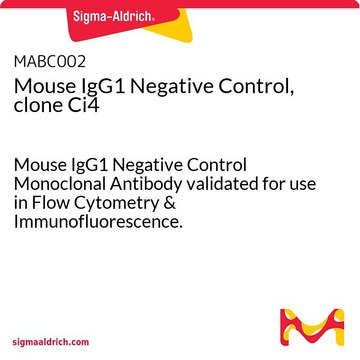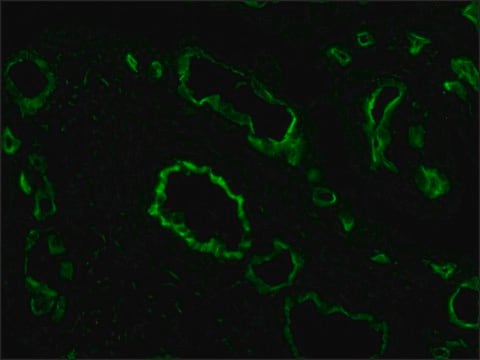MABC006
Mouse IgG2b Negative Control, clone GC198
Mouse IgG2b Negative Control Monoclonal Antibody validated for use in Flow Cytometry & Immunofluorescence.
About This Item
Produits recommandés
Source biologique
mouse
Niveau de qualité
Forme d'anticorps
purified immunoglobulin
Clone
GC198, monoclonal
Fabricant/nom de marque
Chemicon®
Concentration
0.5 mg/mL
Technique(s)
flow cytometry: suitable
immunofluorescence: suitable
Isotype
IgG2b
Conditions d'expédition
wet ice
Modification post-traductionnelle de la cible
unmodified
Spécificité
Immunogène
Application
SUGGESTED USAGE
The control antibody should be diluted to the same concentration as the test antibody, and equivalent volumes used.
Secondary & Control Antibodies
Epitope Tags & General Use
Isotype Control Antibodies
Liaison
Forme physique
Stockage et stabilité
WARNING: The monoclonal reagent solution contains 0.1% sodium azide as a preservative. Due to potential hazards arising from the build up of this material in pipes, spent reagent should be disposed of with liberal volumes of water.
Informations légales
Clause de non-responsabilité
Mention d'avertissement
Warning
Mentions de danger
Conseils de prudence
Classification des risques
Met. Corr. 1
Code de la classe de stockage
8B - Non-combustible corrosive hazardous materials
Classe de danger pour l'eau (WGK)
WGK 2
Point d'éclair (°F)
Not applicable
Point d'éclair (°C)
Not applicable
Certificats d'analyse (COA)
Recherchez un Certificats d'analyse (COA) en saisissant le numéro de lot du produit. Les numéros de lot figurent sur l'étiquette du produit après les mots "Lot" ou "Batch".
Déjà en possession de ce produit ?
Retrouvez la documentation relative aux produits que vous avez récemment achetés dans la Bibliothèque de documents.
Notre équipe de scientifiques dispose d'une expérience dans tous les secteurs de la recherche, notamment en sciences de la vie, science des matériaux, synthèse chimique, chromatographie, analyse et dans de nombreux autres domaines..
Contacter notre Service technique

![3-Aminoimidazo[1,2-a]pyridine 97%](/deepweb/assets/sigmaaldrich/product/structures/177/879/133fd1ee-499a-4242-9d3c-406e87ce1d6c/640/133fd1ee-499a-4242-9d3c-406e87ce1d6c.png)







